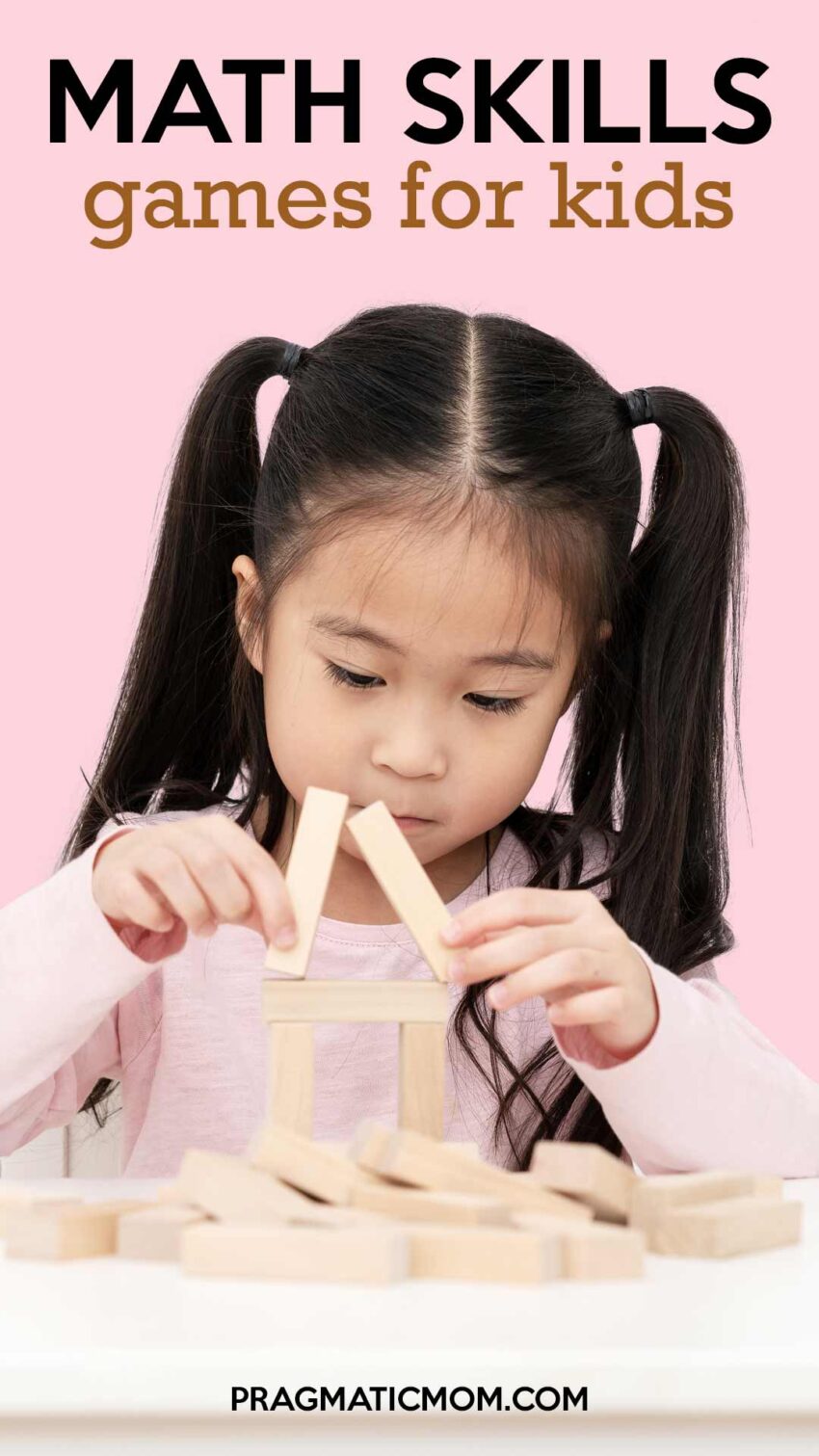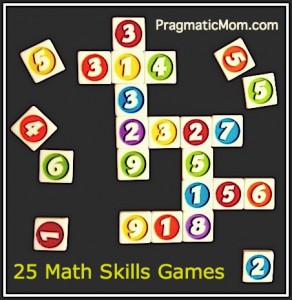As the school year starts to wind down, I’m longing for summer even though the school year is in full force and quite hectic this time of year. Every summer, I bribe my kids to do some math review so I’m also starting to think about what workbooks to buy. Some moms I know manage to do math review in a fun, gaming kind of way. It makes me think that summer math can and should be fun.
Since this is not my forte, I’m thrilled to introduce Karla Valenti of Tot Thoughts, who created a list of 25 fun and free math skills games to play with kids.
Are you thinking of doing summer math with your kids? What resources and games will you using? Please share. I could use the help!
25 Fun and Easy Math Skills Games
So, your child struggles with math?
They pay attention, they work hard, they do their homework and yet… those tricky math concepts simply refuse to sink in.
You bring in tutors, you practice flash cards, you spend hours going over worksheets, drilling your child in the car or at the breakfast table.
You tell yourself that if your kid just keeps at it, one day, it’ll “click.” But deep down, you’re worried that they’re falling further and further behind. Your child’s teacher is worried too.
And your child is starting to think they’re not smart. Worse, you’re starting to wonder if that might not be true.
Well, here’s the truth about mathematical ability
Actually, it’s two truths:
- Your child’s intelligence has little to do with his math skills
- Improving your child’s math skills is as simple as teaching them how to think logically and mathematically
Let me explain.
Truth #1: Intelligence is not about math
We have a tendency to think of intelligence as a thing that we all have in varying degrees. We figure out how intelligent our child is by measuring their performance in certain areas (like math) against his peers. We then realize that some children (not necessarily ours) are smarter than others.
But that’s wrong.
It is a mistake to think of intelligence as being a single thing, something we can measure on a spectrum of more or less based on how much we know about something. And it’s hurting your child to think this way.
In 1983, the developmental psychologist Howard Gardner outlined a theory that has virtually revolutionized the way we understand intelligence and our children’s ability to process information.
This theory explains that humans actually have eight intelligences (as opposed to one general intelligence): linguistic, spatial, musical, logical-mathematical, interpersonal, intrapersonal, bodily-kinesthetic, and naturalistic. We all have all eight of these intelligences and we use them to varying degrees, creating an intelligence profile that is unique to us.
Let’s be clear, we’re not talking about personality types, we’re not talking about behavior, we’re not talking about tendencies. We are talking about intelligence, your child’s intelligence.
So now, when we say a child is good at math, what we really mean is not that they are more intelligent but that they favor their logical-mathematical intelligence. In other words, they prefer to process information when it is presented in a logical and abstract manner; they tend to think critically and are naturally drawn to patterns and categorizations.
Here’s the big secret –> math is traditionally taught in a logical and abstract way, which means that children who favor their mathematical intelligence, will easily grasp those concepts. However, children who favor other intelligences will struggle.
In other words the problem isn’t your child, it’s the way they are being taught math.
Truth #2: Improving your child’s math skills is about teaching them to think mathematically.
What your child needs is two things:
- To be exposed to math concepts in ways that resonate with his particular intelligence
- To develop his logical-mathematical intelligence.
The first part is not an easy feat and one that most schools cannot afford as it requires a great deal of customization. However, that doesn’t mean you can’t step in and I have a lot of ideas for you to test out on Tot Thoughts.
The second part involves these 25 easy activities your child can do to improve your child’s logical-mathematical intelligence.
These activities are presented in levels of increasing complexity. The levels are in no way related to a child’s age or grade. They simply invite children to start at whatever level they prefer and to continue feeling engaged and motivated as they advance to the more challenging levels (and hey, as an added bonus, many of these activities also help develop your child’s other intelligences).
LEVEL 1
- Read a story and identify the key elements of the story. Then create an outline of the story.
- Collect a variety of leaves and classify them in five different ways.
- Practice adding, subtracting and dividing by making groups of raisins, buttons or other objects (don’t worry so much about your child being able to say “2+2 = 4” but rather just have him handle the groups of items in different ways).
- Sort a variety of household items into different colors or shapes.
- Create different sound patters (by clapping or stomping your feet) and have a friend imitate them.
LEVEL 2
- Make a puzzle.
- Create a maze or crossword puzzle for a friend.
- Listen to patterns in music.
- Gather random assortments of items from your house and arrange them in different pattern. Have your friends guess your patterns.
- Measure different things with your various body parts. Compare the lengths of different items in your house.
- Predict the ending of a book you are reading.
- Map out the main ideas and sub-points of each idea from a book you are reading. Think of a new story and map out the main ideas and sub-points of each main idea for your new story.
- Create new riddles and share them with your friends.
- Write directions for completing a task and then give them to someone else. Discuss how effective the directions were in helping the other person complete the tasks.
- Think of a problem you are currently facing and illustrate a machine that you would create to help you solve the problem.
- Create patterned number sequences and have someone else identify the pattern. Try creating patterns with shapes or words as well.
LEVEL 3
- Create a secret code and write it down in a code key format. Write letters using your code key. Share your code key with someone else and see if they can decipher your message.
- Choose one of your favorite books and write the next episode or continuation of the story.
- Pick a topic to discuss and find arguments to support both sides. Have a debate with someone else. Give each other feedback about the strengths and weaknesses of the arguments.
- Find examples of history “repeating itself” or think of a time when the same mistake has been made multiple times. Reflect upon why this is and how those mistakes could have been avoided.
- Follow a recipe to make a cake from scratch. Illustrate the recipe.
- Create a dance using ten different dance steps. Teach the dance to a friend.
- Create a paint-by-numbers picture for someone else to color.
- Make a calendar and keep track of important events.
- Take a walk and notice patterns in nature.
So there you have them –> 25 easy ways to help your child improve his math skills.
If they seem like fun, that’s because they are designed to be entertaining and yet challenging. That doesn’t mean your child won’t be learning or developing their logical-mathematical intelligence. In fact, what you’ll be doing is instilling in your child a love of learning.
Because let’s face it, deep down, you know your child is intelligent. Now help them realize that too!
Let’s make it easy: pick five activities that you think you’re child will enjoy and give it a try.
Karla Valenti writes Tot Thoughts where you can get other tips and ideas on on raising intelligent, creative and empowered tots. Get more on Facebook, Twitter, G+, or Pinterest.

Follow PragmaticMom’s board Math Fun on Pinterest.
BEST #OWNVOICES CHILDREN’S BOOKS: My Favorite Diversity Books for Kids Ages 1-12 is a book that I created to highlight books written by authors who share the same marginalized identity as the characters in their books.












Great post! And my son loves the sumoku game in the photo! 🙂
Thanks Erica! We haven’t tried Sumoku but now I will try it with my kids!
I’m so excited about these! I’ve been trying to do the summer workbooks as well, but they’re so borrrring.
Hi Jeanette,
I guess I’m a mean mom. I make my kids do math workbooks but I’ll change it up with games this summer too.
All great ways to get kids to do math without realizing it! That’s the key because when you present them with a workbook, they suddenly associate it with school and are no longer interested!
Hi Barbara,
You are right about that! I have to bribe my kids to do summer math workbooks. I’m going to try some games this summer as well just to make it more fun. I need algebra games … must research!
What a fun post! Can’t wait to try these fun games 🙂
Thanks Stacey and thanks to my guest author, Karla Valenti of Tot Thoughts!!
Yes! There are many different ways to learn math!
Hi MaryAnne,
I like the idea of math games but never really went that route for fear it was too specific and it wouldn’t be comprehensive enough. I think I am totally wrong about that!
This is such a true statement: “Improving your child’s math skills is as simple as teaching them how to think logically and mathematically”
Just having young ones begin to group items by color, size, texture, etc is a great way to introduce the basic analytic roots of mathematical concepts!
Hi Cathy,
I like how Karla Valenti of Tot Thoughts breaks it down so simply too.
Thanks, Mia! I’m always looking for summer math activities to prevent some of that brain drain!
I heard a segment on NPR about Khan Academy (which I need to check out more fully), but it’s an free online service dedicated to empowerment and making education more accessible for everyone (everyone who has a computer that, is!)
It covers K-12 math, and some advanced science topics, but I was also planning to use this for a summer math/science program for my rising 6th grader: http://www.khanacademy.org/about
Thanks Maria. I will check it out. I need some math curriculum for rising 8th grade, especially for Algebra, her nemesis.
Games always helped me learn in school a lot better. I will remember this post for when I am teaching my son math.
Hi Tanya,
I need to try more games myself for summer math. I’ll be searching for 8th grade algebra games. I bet there are a bunch and I just don’t know about them yet. Will post on that soon!
When I was doing my teacher training, I was taught that Children learn through play – I guess that’s why they catch up so fast when they learn maths through games.
Hi Viren,
Good point! Play is probably more powerful learning too!
Lots of great ways to practice even the simplest math concepts! Thanks for sharing at Mom’s LIbrary!
Thanks for hosting Mom’s Library Ashley!
Great ideas! I like Truth #1 and #2! 😀
Thanks Erik! I’m glad you like them! Do you do summer math? I know you’ll read a lot this summer!!
This was really interesting! I would love to learn more about Howard Gardener’s theory. Definitely going to try some of these this summer! Printing this list!
Hi Ann,
I’m so glad you are finding the math games helpful!!
Featured you on Mom’s Library this week!
Thanks so much Ashley!!
Very interesting! Love the 25 activities that are not so mathematical! I am featuring this article on Mom’s Library on iGameMom. Thanks for sharing!
Thanks so much iGameMom!!
Thank you so much for this. It has taken me quite a lot of searching. I have printed this out and pinned it on my idea wall. I was looking of ways to wean my kids off online games (like http://www.mathblaster.com and Cool math and other such websites). I’m going to forward these to my friends.
Hi Maya,
I’m so glad this list of math games is helpful. My son loves online games as well and I agree with you; I’d prefer the games to have a little academics thrown in. I have to say that many of these games are really, really fun so your kids might not notice the difference!